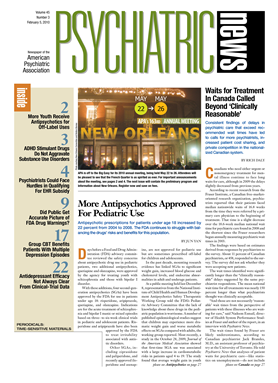Depression is a well-known risk factor for a variety of cardiac ills, but while treating heart patients with antidepressants apparently alleviates their depression, the medications' effects on cardiovascular outcomes are less clear.
Several new studies only complicate the issue by suggesting that—in some cases, at least—using antidepressant medications is associated with increased risk of cardiovascular or cerebrovascular disease.
The key word is “associated” because these, like so many other studies, are observational, raising hypotheses and hinting at a connection but not structured to determine causation.
For instance, in March 2009 a report by Whang and colleagues in the Journal of the American College of Cardiology and based on the Nurses' Health Study, found that in 63,469 women without baseline coronary heart disease (CHD), depressive symptoms were associated with fatal CHD, and “a measure of clinical depression including antidepressant use” was associated with sudden cardiac death. The authors said that finding “merits further study.”
A more recent analysis, drawn from 136,293 postmenopausal women in the Women's Health Initiative, found that tricyclic antidepressants (TCAs) and SSRIs were associated with increased risk of mortality and that SSRIs were associated with increased risk of hemorrhagic and fatal stroke.
The relative risk for stroke was 45 percent greater among those taking SSRIs than in those not taking SSRIs, although the absolute risk was low—0.42 percent for those taking SSRIs versus 0.30 percent for those not taking the drugs—emphasized lead author Jordan Smoller, M.D., Sc.D., assistant vice chair of the Department of Psychiatry at Massachusetts General Hospital and an associate professor of psychiatry at Harvard Medical School. The study appeared in the December 14/28, 2009, Archives of Internal Medicine.
There were no differences in risk between women taking SSRIs and those taking TCAs.
“It's hard to tease apart the risks of the drug versus underlying risk factors like depression,” said Smoller in an interview.
At a minimum, antidepressant use may be a marker for increased morbidity and mortality in older women. Doctors need to be vigilant about those cardiovascular risk factors, said Smoller.
“The information in this study should be part of the risk/benefit discussion with patients, but women should not stop taking antidepressants on the basis of this study alone,” he said.
Drug Combination Increased Risk
Another report was based on data from 519 subjects in the Women's Ischemia Syndrome Evaluation. That study, reported in the December 2009 Heart, included women with ischemic symptoms who had undergone clinically indicated coronary angiography. Antidepressant and anxiolytic medication use at study entry was self-reported. The Beck Depression Inventory was used to assess depression symptoms.
Over the follow-up period (median 5.9 years), researchers recorded 81 cardiovascular events and 46 all-cause deaths.
After adjustment, combined use of antidepressants and anxiolytics predicted more cardiovascular events and mortality compared with women who did not use those medications, although use of antidepressants or anxiolytics alone did not.
Again, because the women were not randomly assigned to treatment, wrote the authors, “a causal relation between psychotropic medications and CV events cannot be established.”
The women in this study had a complicated mix of symptoms, said lead author David Krantz, Ph.D., professor and chair of medical and clinical psychology at the Uniformed Services University of the Health Sciences in Bethesda, Md.
“They have persistent chest pain, their functional status is impaired, but they are not well treated for anxiety and depression,” he said. They may or may not have ischemia, in addition to their reports of symptoms. In fact, medication use may simply indicate more severe or refractory underlying psychiatric symptoms.
Large, Randomized Trials Needed
The only way to answer these questions is to conduct large randomized, controlled trials, said both Krantz and Smoller, echoing many other researchers in the field. Such trials would not necessarily require a placebo arm. Nonmedical treatments for depression, like cognitive-behavioral therapy, could serve as control conditions.
“If the study was large enough and long enough, we might get at the answer,” said Smoller.
